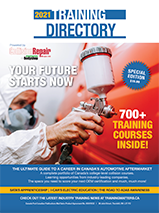Joining the team
In January, RePowered Batteries joined the Ontario Automotive Recyclers Association as an Associate Member.
Headquartered in Gatineau, Quebec, RePowered takes electric vehicle batteries and repurposes them for future use in everything from solar power storage systems to grocery store grids. “RePowered Batteries take batteries from end-of-life electric vehicles and dismantle them to build new batteries for micro-grid systems. Like a big backup battery,” said Julien Lemay, CEO of RePowered Batteries.
“The goal is to give batteries a second life—to extend the life of electric vehicle batteries, reduce the reliance on new material and also delay their recycling so that methods have improved by the time they get to recycling and metal extraction.”
Last year, RePowered Batteries set up its pilot plant. “We see immense value in being properly connected to Canada’s auto recyclers,” said Lemay. “They are an integral part of our value chain. Joining OARA as a member makes perfect sense for us.” Lemay is also the founder of the Canadian Second Life Battery Assocation, an organization advocating as a unified voice for second- life battery manufacturers.
You can learn more about the organization by visiting cslba.ca.
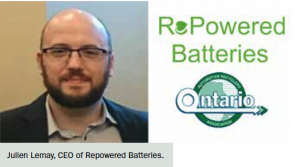
Scrap in Saskatchewan
The government of Saskatchewan has introduced legislation with the aim of tightening up regulations surrounding scrap metal theft in the province.
The legislation includes an update to the Pawned Property Amendment Act and the requirements for reporting for scrap metal dealers. The changes would require that dealers obtain and record the identification and transaction information of the client from whom they are purchasing scrap metal, as well as the imposition of further restrictions on cash transactions in the attempt to curb the anonymous sale of stolen scrap metal.
Theft of scrap metal, copper wiring and automotive parts has been on the rise nationwide over the last several years. However, the isolation of many rural residences in Saskatchewan makes the province an even more appealing home base for would-be thieves.
As well, changes to the Traffic Safety Act will give police the ability to press charges for numerous actions commonly associated with auto theft, such as falsifying documents for the sale or registration of a vehicle or altering a VIN.
Currently, police have to investigate and charge someone under the Criminal Code. The proposed changes will give police the ability to issue a summary offense ticket without requiring Criminal Code proceedings.
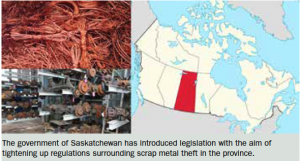
Data Drive
The Automotive Industries Association of Canada (AIA Canada) is urging collision repairers to take action in the fight for access to vehicle data.
During Tuesday’s Your Data. Your Choice webinar session, J.F. Champagne, AIA Canada president and Bill Hanvey, CEO of the U.S.- based Auto Care Association, delved into details of the campaign and provided an update on its progress as collision repairers across North America fight for access to vehicle data.
“Of course, we all like the convenience technology brings, but 85 percent of vehicle owners are unaware the vehicles transmit data and that access to that data is being threatened,” said Hanvey. Within the next two years, AIA Canada predicts up to 95 percent of all new cars sold in Canada will be connected cars—vehicles that are constantly communicating information in real time to automak-ers. According to Hanvey, automakers in the U.S. have spent US$30 million defending OEM control of data in the courts.
“Unless automakers are forced by regulations, they aren’t going to release that control,” said Champagne.
“We’ve tried—and quite honestly, we haven’t been taken seriously. The only way to rectify this is through legislation,” said Hanvey. “We need the petition signatures to say, ‘look, the consumers have spoken’ with 100,000 signatures in Canada and 150,000 in the U.S.” J.F. Champagne, AIA Canada president.
The government of Saskatchewan has introduced legislation with the aim of tightening up regulations surrounding scrap metal theft in the province. Automaker resistance is nothing new to the collision repair industry. While the sector has been reliant on on-board diagnostics for repairs since the 1980s, there was a time the automaker fought for repairer access to these systems.
“We need to fix cars right. Access to the right information in an or-derly fashion is no question—the access to vehicle data absolutely ties into the quality of collision repair,” said Champagne. Currently, the same OEM restrictions that prevent collision repair facilities from accessing data from vehicles also prevents auto recyclers from gaining access to information which would make it far more prof-itable to dismantle connected vehicles.
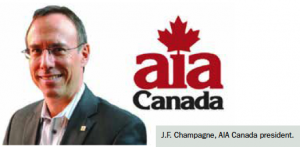
Time’s Up
Vehicle recyclers are calling on the World Trade Organization (WTO) to pursue legal solutions and best-practices recommendations that eliminate the harmful practices of vehicles and components manufactured to electronically block the re-use of parts.
A proposal has been composed by FORS Association from Poland in cooperation with several other vehicle recycling associations from around the world, to the WTO.
This proposal is expected to highlight the problems vehicle recyclers face when it comes to electronic security features on vehicles, and how if dismantlers had access to unlock these features, there would be the possibility to re-use more parts.
The proposal is calling for the WTO to look at legal solutions to eliminate ‘harmful practices of vehicle and component manufacturers to electronically block the re-use of parts. Vehicle recyclers are appealing that consumers and car operations can have electronic security unblocked free of charge so that removed parts can be used in other vehicles.
New Lease on Lithium-Ion
A PhD student from Dalhousie University has cracked the secret to reincarnation—for retired electric vehicle batteries, of course, which he is hoping will fuel the power grids of the future.
Chris White is looking for ways to convert “second-life” EV batteries to renewable energy sources that may one day be used to power electric grids.
“We want to convert things that run on fossil fuels to run on electricity,” said White in an interview with The Chronicle Harold. “So battery-powered electric vehicles instead of gas-powered cars. And electric heating instead of oil and gas furnaces.
“And then we want to convert our electricity systems to run on renewables instead of fossil fuels, so the electricity we’re using for our cars is clean and not coming from coal power plants, for example.”
White identifies an issue that has yet to be solved when it comes to EV batteries, however.
“And another problem is that electric vehicle batteries— EV batteries—will eventually end up as waste,” said White. “We’re already producing millions of EVs per year and this will soon be tens of millions per year and every EV has a large lithium-ion battery. The biggest ones I’ve seen are about the size of a double mattress.”
Controlled Collisions
End-of-life-vehicles are providing Ajax’s first responders with life-saving training opportunities thanks to a partnership between the city’s fire and emergency services and their local auto recycler, Dave Langille of Durham Auto Parts.
In late October, Ajax Fire and Emergency Services took part in a training session involving a decommissioned city bus that first responders had the opportunity to manipulate into various accident scenarios, providing what Ajax fire chief training officer Reno Levesque considers to be an invaluable training experience.
This ongoing relationship also allows first responders to stay up-to-date on changing vehicle materials and technologies that may affect their ability to respond to an emergency.
Levesque notes that addressing and adapting to these changing technologies has become a priority for emergency response education.
“That’s a huge component of what we do now. With all the airbags and different safety systems that are in there. There are different means of transport, not just traditional gasoline engines. All of that vehicle technology is really important to us.
Maritime Marauders
In January, a Newfoundland auto recycling facility lost $8,000 worth of scrap auto parts after thieves cut their way into a metal shipping container.
Leaving a square hole making that looked as though it was cut by an oversized can-opener, the criminals managed to make off with copper wire, car batteries and catalytic converters from Newco Metal and Auto Recycling in Marystown, Newfoundland.
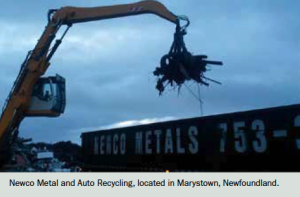
Conference to commence
Members of the automotive recycling industry are salvaging up some excitement for the United Recyclers Group (URG) Training Conference, set to kick off August 5th to August 7th in Dallas, Texas.
The theme of this year’s event will centre around “The Challenge of Change” and how the auto recycling industry has worked to adjust to the new normal of 2020, as well as new challenges that could arise in 2021. The conference will also play host to URG’s annual golf tournament to benefit the URG Scholarship Foundation. Entry for the tournament costs $200 at the door or $175 with early bird registration.
The URG Training Conference is currently scheduled for August 5-7 at the Hyatt Regency in Dallas Texas. A standard full conference ticket costs $450.
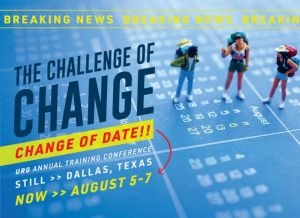
Retire Your Ride Thrives
Canadians appear to be rethinking the need for secondary vehicles during the social isolation era. Or with fewer miles driven, it makes maintenance a bit harder and more costly to keep that older vehicle on the road. Either way, for many it appears to be the perfect time to cash in on selling, according to a report from the Automotive Recyclers of Canada (ARC).
The Retire Your Ride program, managed by ARC as an exclusive benefit for its Members, is there to help Canadians navigate the proper and final disposal of their older vehicle and provide a healthy financial return at the same time.
Auto recyclers are always hungry for vehicles to part out for inventory, and with fewer vehicles at the salvage auctions, many have turned to Retire Your Ride to help fill their buying needs. In addition scrap prices – especially prices for precious metals found in catalytic converters – have risen sharply.
This has resulted in a year-over-year increase consumers are seeing with the Retire Your Ride program of up to 30%, according to the auto recycling advocacy group.
“People are staying at home, worrying about money, and certainly driving less. Many people are making the decision to get rid of secondary vehicles,” said the ARC’s executive director Steve Fletcher. “Auto recyclers, too, are making good use of the program. As salvage prices have gone up, Retire Your Ride has begun to become a more appealing place to turn.”
The program allows drivers to put their vehicle up for bid among certified ARC auto recyclers, with the highest bid being paid out to the driver (as well as a free tow). The winner bidder picks the clunker up at the owner’s home free of charge and the owner gets paid at the door.
Winning bids vary by province, type of vehicle, condition, and location with an average bid in the $200 to $500 range. The Retire Your Ride program became popular during the great recession of 2008 – 2009. Started as the National Vehicle Scrappage program, ARC assumed control of the program in 2012 and began a series of improvements and efficiencies.
Today, the auction process retires 10 to 20 cars a day across Canada, and uses the ARC network of certified auto recyclers to ensure each vehicle is retired responsibly. Each sale is tracked to make sure the car is scrapped.
ARC also runs the Car Heaven program. Operating similar to Retire Your Ride, but for these vehicles, the donor gets a tax receipt for the value of their vehicle, and one of 40 national and local charities gets the full proceeds of sale of the vehicle. Since 2000, ARC has raised over $4.2 million for charities through Car Heaven.
Recently there has been a lot of discussion about bringing back a national vehicle scrappage programs. Should manufacturers or the government be considering a scrappage program, Fletcher offers his advice: “First of all, go with a reasonable incentive in the $1,000 range as they did in the past, with either the automaker or government or combination funding that amount. Anything over that threatens the used car market.” “We are looking at the big picture. We want to make people aware that the Retire Your Ride program is still operating. We still have the network of certified auto recyclers. We still use the database engine that drove the original national scrappage program. We still have the brand awareness of Retire Your Ride as the only national vehicle retirement program. So, if someone wants to put an incentive behind it and turbocharge it, we have the tow trucks, recycling yards, and capacity to handle all of that throughout Canada.”
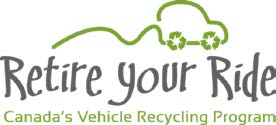
Running Regulations
The United Nations Environment Programme (UNEP) is prepared to take part in a new initiation supporting the introduction of global minimum used vehicle standards, following a United Nations (UN) report revealing a significant effect on the environment and climate change.
A recently released United Nations (UN) report, based on an in-depth analysis of 146 countries, found that some two-thirds of them have ‘weak’ or ‘very weak’ policies to regulate the import of used vehicles.
According to the report, the fast-growing global vehicle fleet is a major contributor to air pollution and climate change. The UN says, globally, the transport sector is responsible for nearly a quarter of energy- related global greenhouse gas emissions. Specifically, vehicle emissions are a significant source of fine particulate matter (PM2.5) and nitrogen oxides (NOx) that are major causes of urban air pollution.
The export of vehicles that should be recycled domestically is also a major issues for auto recyclers around the globe.
Fuelled by Ford
Ford is not only the most popular automaker in Canada—the automaker’s models are also the most common brand retired through Canada’s Retire Your Ride vehicle recycling program in the last year. Out of all Ford models, the Escape and Focus were retired the most often through the program.
The most popular vehicle recycled is the 2004 Honda Civic with 32 vehicles across Canada turned in, and in fact, five of the top 10 vehicles retired were Honda Civics.
While brand loyalty isn’t quite the force in the automotive world that it once was, there are still plenty of people who have a preferred car brand and stick with it. It could very well be that Ford owners deciding to retire their ride this year, simply purchased another Ford.
Ford sold 60,582 units in 2019 to beat out its competitors, and about half of that number was solely from sales of the extremely popular F-150.
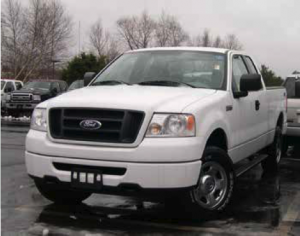
The Rush of the Crush
The recycling industry has a brand-new mobile game made just for them—Scrapyard Tycoon is here, available on all iOS and Android devices.
This latest idle game from Neon Play allows players to operate their very own scrapyard.
You can make decisions like whether you want to crush cars or recycle them; you can even break your cars down into parts to sell.
Take control of a crane, a car crusher, fill your warehouse up with spare parts—the choice is yours.
As well, players can acquire blueprints and craft new items that will help restore their vehicles and turn a profit for the scrapyard.
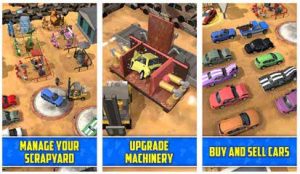
EZ Additions
EZ Suite is excited to announce two new additions to their team with Chris Atencio and Laurie Woods joining the company in management positions, according to a press release issued last week.
Atencio will be taking the lead as director of sales while Woods will be responsible for customer relations while at EZ.
Atencio joins the company with more than 20 years of experience, most recently as national sales director at CCC Pinnacle.
On the other hand, Woods will be coming on board with more than 30 years of experience in the auto recycling industry working in a number of roles; focussing mainly on the training and implementation of software products.
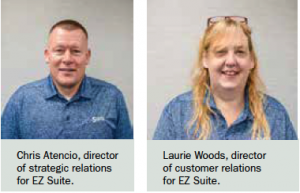
Scrap Stars
The auto recycling industry is finally getting some of the star power it deserves as YouTube-based “picking” show Totaled Treasure released its second episode in late-December.
Styled in a similar vein to shows like “Canadian Pickers” and “Storage Wars”, “Totaled Treasure” follows Vince Edivan and Aaron Stone as they travel across America visiting auto recycling facilities to dig through the abandoned vehicles in search of valuable, interesting, or just plain strange artifacts.
Not only do the pair seek to entertain, however, but also spread awareness about what is an often overlooked but nevertheless vital aspect to the lifecycle of a vehicle. The introduction of the show provides a brief overview of the history of auto recycling with much of the messaging of the show reinforcing the idea that what is abandoned is not necessarily junk.
Vince Edivan is the Director of Member Relations for the Automotive Recyclers Association (ARA) and brings his considerable marketing skills to promoting professional auto recyclers to each Totaled Treasure episode.
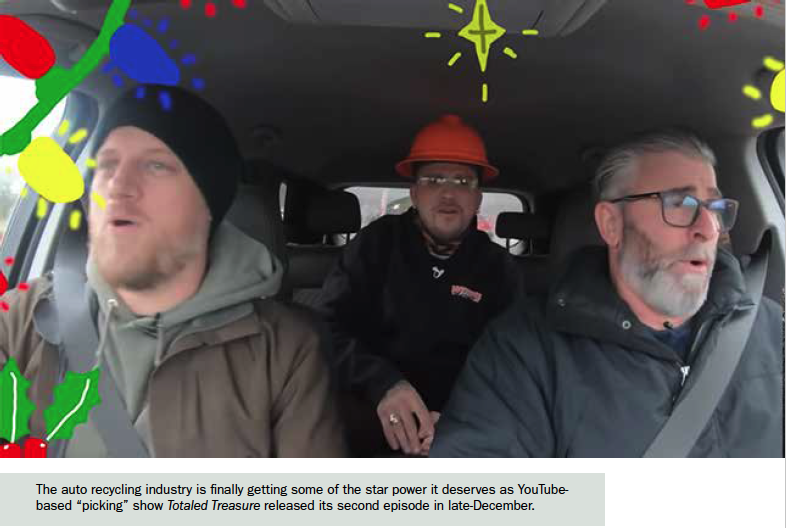
Scrap Stars
The auto recycling industry is finally getting some of the star power it deserves as YouTube-based “picking” show Totaled Treasure released its second episode in late-December.
Styled in a similar vein to shows like “Canadian Pickers” and “Storage Wars”, “Totaled Treasure” follows Vince Edivan and Aaron Stone as they travel across America visiting auto recycling facilities to dig through the abandoned vehicles in search of valuable, interesting, or just plain strange artifacts.
Not only do the pair seek to entertain, however, but also spread awareness about what is an often overlooked but nevertheless vital aspect to the lifecycle of a vehicle. The introduction of the show provides a brief overview of the history of auto recycling with much of the messaging of the show reinforcing the idea that what is abandoned is not necessarily junk.
Vince Edivan is the Director of Member Relations for the Automotive Recyclers Association (ARA) and brings his considerable marketing skills to promoting professional auto recyclers to each Totaled Treasure episode.
























